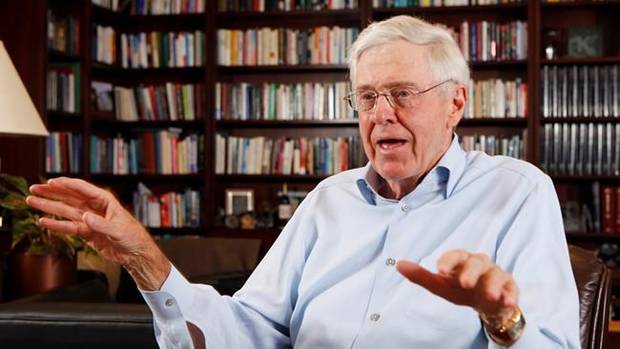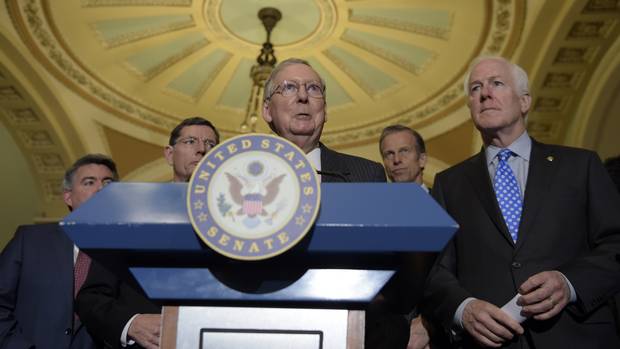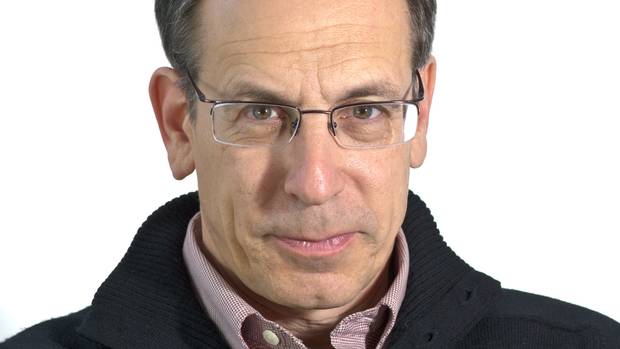President Donald Trump is publicly blaming Democrats for the first significant legislative setback of his nascent presidency, a failed effort to reform health care.
It's a well-worn political tactic; the problem is the debacle's architects are on his side of the political aisle.
In the past seven years, Republicans in the U.S. House of Representatives passed legislation to repeal the Affordable Care Act – more commonly known as Obamacare – on more than 50 occasions.
When they finally saw a Republican in the Oval Office for the first time since 2009, they couldn't agree on enough to even get a repeal bill to the floor of Congress.
As Texas Republican Joe Barton ruefully put it to a gaggle of reporters Friday: "Sometimes you're in fantasy football and sometimes you're in the real game."
It may seem odd to Canadian eyes for a political party to fail to agree on what everyone within it understands to be a keystone electoral promise and legislative priority, but the Grand Old Party is a bird of a different feather.
The health-care reform imbroglio is above all the story of an unconventional president and his advisers butting up against decidedly old-school politics.
"You could see this particular train wreck coming from miles down the track," said U.S. political watcher Carlo Dade, a trade expert at the Canada West Foundation and a senior fellow at the University of Ottawa who is also a senior associate at the Centre for Strategic and International Studies in Washington, D.C.
And now that House Republicans – and their Democratic opponents – understand they can stare down the White House and win, a suite of new questions arises.
Mr. Dade said the ripples could soon be felt in bilateral trade negotiations and perhaps the perennial Canada-U.S. impasse over softwood lumber.
So who are the dramatis personae in this most recent bit of political theatre?
House Freedom Caucus chairman, Representative Mark Meadows, centre, rushes to a caucus in the basement of the Capitol in Washington, Friday, March 24, 2017, before House Speaker Paul Ryan announced that he is abruptly pulling their troubled health care bill off the House floor.
J. SCOTT APPLEWHITE/AP PHOTO
The Freedom Caucus
Like all political parties, the Republicans are a coalition of broadly aligned interests: social conservatives, security and foreign-policy hawks, free-market advocates.
The 31-member Freedom Caucus is effectively a more ideologically rigid offshoot of the Republican Study Committee (another gathering of conservative Republicans).
Most have links to or were inspired by the Tea Party movement, a constituency of populists suffused with a libertarian streak that rose to prominence in 2009.
Their objection to the repeal legislation was, broadly, that it didn't go far enough.
"This is a strain of the party that goes back a long time, through [President Ronald] Reagan, to [presidential nominee Barry] Goldwater, to the John Birch Society and even beyond," said Donald Cuccioletta, a historian and senior research associate at the Université du Québec à Montréal's Raoul Dandurand centre for strategic and diplomatic studies.
"There is a school of thought that the American Revolution itself was a deeply conservative revolution."
When the Freedom-ites decided this week to vote en masse to oppose the repeal proposal – and then refused to blink at Mr. Trump's take-it-or-leave-it final revisions – the math became very complicated indeed for the White House and Republican leadership.
"The Republican leaders have been willing for quite some time to let the Freedom Caucus and the Tea Partiers lead the charge against [former President Barack Obama]. Some worried they would live to regret it, and now I have to think they do," Mr. Cuccioletta said.

In this photo from May 22, 2012, Charles Koch speaks in his office at Koch Industries in Wichita, Kan. A billionaire industrialist and conservative benefactor, Koch and his brother David regularly host hundreds of the nation’s most powerful political donors.
Bo Rader/The Wichita Eagle via AP, File
The Donors
One widely misunderstood aspect of Tea Party politics is the role deep-pocketed conservative donors like Charles and David Koch, the oil billionaires, played in bringing it about.
The Kochs, whose family business was instrumental in developing the Alberta oil sands, have led a sprawling donor network for several years.
This week, multiple reports indicated the staunchly libertarian Kochs and other donors had pledged sizable sums of money – millions of dollars – to help any Republican lawmaker who voted "no" to the repeal bill stave off a primary challenge and win re-election in 2018.
As New Yorker reporter Jane Mayer chronicled in her book Dark Money, the so-called "Koch-topus," a network of 700 or more donors, has raised hundreds of millions to fund campaigns, political-action committees, think tanks (they are the founders of the Cato Institute) and endowed chairs at several universities.
Their work has been simplified since the Supreme Court's landmark Citizens' United decision in 2010, which loosened campaign financing restrictions.
One prominent member of the network, Betsy DeVos, is now Mr. Trump's Secretary of Education.
The Tuesday Group
If the Freedom Caucus represents the hard line, the party's moderate centre can be found within the Tuesday Group – which met on Wednesdays when it was founded in the 1960s.
House Speaker Paul Ryan, who is also wearing a great deal of the blame for last week's events, won the overwhelming support of the Tuesday-ers in his recent re-election.
That didn't stop at least eight of the group's 50 members from signalling their intention to oppose the Obamacare repeal.
Another way to describe these Republicans is as what Vox writer Andrew Prokop dubs the "coverage caucus" – lawmakers worried about the idea that millions of people would suddenly find themselves bereft of health insurance.
The GOP will shortly control all three branches of the U.S. government (assuming Supreme Court nominee Neil Gorsuch is confirmed) for only the third time in 80 years.
It should be an enviable position for Mr. Ryan and the Republican congressional caucus; this week it didn't look that way.
"This is the party of No, don't forget. They're a little out of practice when it comes to actually governing," Mr. Cuccioletta said.

Senate Majority Leader Mitch McConnell, middle, speaks to reporters alongside other Republican senators on Capitol Hill on Feb. 7, 2017.
SUSAN WALSH/ASSOCIATED PRESS
Senate Republicans
Though the House of Representatives is traditionally the first stop for major legislative initiatives, they must also pass the 100-member Senate before landing on the president's desk.
And the powerful Senate Majority Leader, Mitch McConnell of Kentucky, made it clear he wouldn't hesitate to rewrite House legislation that Senate Republicans didn't like.
Though the Senate caucus made sport of obstructionism when Barack Obama was president, the body tends to favour deal making. Unlike the House, where Republicans have a 237-193 majority, the Senate is only split 52-48.
When it started to become apparent this week that the House Republicans might not have the votes for an Obamacare repeal, several Washington media outlets began reporting Mr. McConnell's preferred option was an expedited failure so the party could move on to other priorities like tax reform.
As pundit Josh Barro, no fan of the Republican leadership, wrote on Twitter: " Hey, you know who managed to get through that whole thing without damaging himself? Mitch McConnell."
A screenshot of the Breitbart website. The once-fringe media organization has seen a meteoric rise and its former chief executive, Stephen Bannon, is Donald Trump’s chief strategist.
The Commentariat
In 1987, the Reagan administration did away with the Federal Communication Commission's "fairness doctrine," clearing the way for partisan and ideological agitators on all points of the political spectrum.
On the right, fire-breathing radio personalities like Rush Limbaugh and Glenn Beck begat Fox News, home to influential conservative commentators like Sean Hannity, who makes no apologies about his fondness for Mr. Trump.
The emergence of digital media in the mid-1990s and the subsequent democratization of commentary spawned Drudge Report and, more contemporaneously, Trump-aligned media organizations like InfoWars and Breitbart News.
Each has one or more liberal-leaning analogues (MSNBC being the most prominent) that stoked the protest fires in favour of Obamacare and contributed to the general cacophony of the media environment.
But Republicans can't afford to ignore a company like Breitbart, which is backed by Robert Mercer, a hedge-fund billionaire and longtime member of the Koch network, and is closely identified with Mr. Trump (its former chairman, Steve Bannon, is a top White House adviser).
Mr. Ryan is a longstanding Breitbart target, and the outlet stridently opposed the House legislation.
"The people with the bullhorns don't do policy, they just yell 'kill it, kill it, kill it'," Mr. Dade said. "It put the leadership and a lot of House members between a rock and a hard place: get attacked by the media if you don't vote for repeal, or risk losing in the mid-terms."
MORE FROM THE GLOBE AND MAIL

